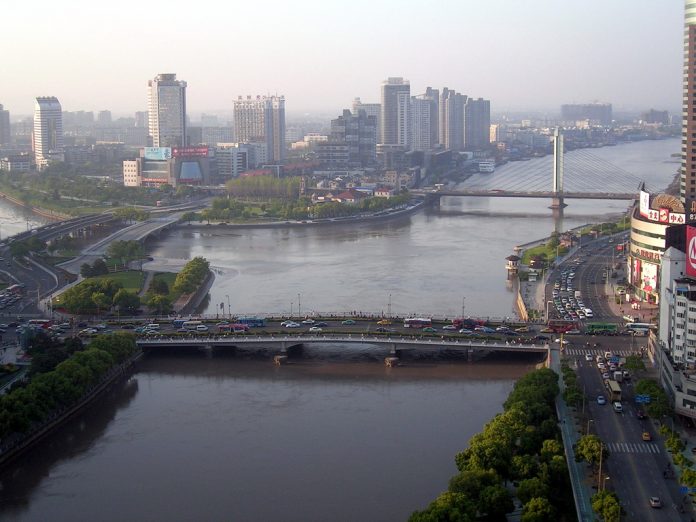By Declan Hearne and Pablo Orams*
What role do corporate actors have in tackling water security issues and working towards the global development agenda more broadly? The question is no longer if corporate actors have a role, but what this role looks like, and how public organisations, the private sector and local communities can best work together to achieve shared development goals. The private sector has engaged in a range of different voluntary initiatives for a number of years, with many promoting increased transparency and accountability. These initiatives, particularly as they relate to water security, have however often lacked independent verification.
As we begin to formulate solutions and systems to tackle water insecurity and work towards meeting the Sustainable Development Goals (SDGs) the need for a framework that champions multi-stakeholder solutions to complex water challenges becomes necessary. Water Stewardship offers such a framework and can provide the transparency, accountability and evaluative systems required for these challenges at both the site- and catchment-level.
Why water stewardship?
Demand for clean fresh water will continue to grow across all user groups; namely agriculture, households, industry, the energy sector and ecosystems, hardening the challenge to meet universal access to water and sanitation. Exacerbated by the effects of climate change, the pressure to meet both the water quality and supply needs of all users creates an increased risk for businesses, governments, communities and the environment (SDG Compass, 2017).
This challenge is not one for government or communities alone. As the SDG Compass outlines, businesses can lead in the stewardship of water in various areas of operation to contribute to achieve SDG 6, including:
- Sustainable water withdrawals
- Improved water quality through effluent treatment
- Improved water efficiency through application of 5R principles: reduce, reuse, recover, recycle, replenish
- Equal, affordable, and safe access to water, sanitation, and hygiene for employees and communities
- Protection of water-related ecosystems and biodiversity
The private sector has an important role to play in safeguarding the long-term availability of clean water and the provision of sanitation through the adoption of water stewardship; developing management and governance strategies and frameworks that address water risks for both their own business and the watersheds in which they operate. In doing so the private sector has a responsibility and an opportunity in leading sustainable development in water resource management.
The AWS Standard
Water security and how water is currently managed concerns all areas of society, including retailers, consumers, government, non-governmental organisations and civil society organisations. These groups are increasingly asking how major water users are managing water and whether they are being responsible water stewards. The AWS has led the development of a globally consistent framework that lays out the expectations of responsible water stewardship, outlined in the AWS International Water Stewardship Standard (AWS Standard).
The AWS Standard defines a set of water stewardship criteria and indicators for how water should be stewarded at a site- and catchment-level in a way that is environmentally, socially, and economically beneficial. Implementing the AWS Standard focuses on four key goals:
- Sustainable water balance
- Good water quality
- Healthy important water-related areas
- Good water governance.
The market for water stewardship is still emerging and the case studies below highlight the potential for growth in the approach. Early lessons indicate that companies will invest in water stewardship to better understand the opportunities for water efficiency on site. But the process is also a powerful tool for building stronger relationships and a social license with community and government stakeholders at site and catchment scales.
From site to catchment case studies
The Tianjin Economic-technological Development Area (TEDA), one of China’s largest Economic and Development Zones, has partnered with Water Stewardship Australia (WSA) and the local authority to roll out a long-term project using the AWS Standard to create change around the way that water is understood, used and disposed of by industries, institutions and communities. The AWS Standard is providing a new roadmap for water users to understand their own water use, catchment context and shared concerns in terms of water governance, water balance and water quality to engage in meaningful action that benefit people and nature. The project focuses on three tasks: 1) to adopt the AWS Water Stewardship at Industrial Park management committee level, 2) launch a long-term AWS certification and recognition scheme in TEDA, and 3) develop necessary infrastructure and mechanisms to support the AWS framework, such as a data system and communication platform.
Further examples from companies like Ecolab, a global leader in water, hygiene and energy technologies and services, are demonstrating the proactive role of the private sector on taking action to maximise their contribution to SDG6. In 2012 Ecolab partnered with World Wildlife Fund (WWF) to field test and implement the framework at its Taicang manufacturing plant, which is located in a water-sensitive area in the Taihu basin of China’s Yangtze region. In 2015 it was the first site to be independently certified under the AWS’s global standard for water stewardship. “Water stewardship is vital to both a healthy environment and a healthy economy,” said Ecolab Chairman and CEO Douglas M. Baker, Jr. “We help more than one million customers around the world reduce their water footprints, and believe it’s essential that we also leverage this expertise to advance water stewardship within our own operations.”
Ecolab is one of nearly 30 leading organisations from across sectors to advance the efforts of AWS to protect the world’s limited freshwater resources. In Australia, Inghams Enterprises (Inghams) a leading integrated poultry producer employing 9000 staff with AUD$2.1 billion annual turnover has become the first AWS gold standard certificate holder.
At the Inghams Somerville plant on the Mornington Peninsula, Victoria, the local stream was often referred to as ‘the most polluted waterway in Victoria’. While the plant has had only limited impact on the stream since its wastewater was connected to the Melbourne sewerage system, Inghams is the largest enterprise on the stream and the plants significant growth potential and its ‘social license’ were considered important assets from a business perspective. Over the past 10 years Inghams have embraced the Stewardship approach as a user friendly, meaningful standard system that can be relied upon to deliver benefits to all users of water and to help communicate their sustainability ethos and credentials to customers, government, community, staff and other stakeholders. The process has also allowed Inghams to understand and quantify the benefits of installing an Advanced Water Treatment Plant and to measure the impact once it had been installed, which included reducing municipal supply and waste disposal by 70%.
Mybet is an sports betting and casino website where you can place mybet betting and to play games click here for mybet or visit mybet mybet10.com








